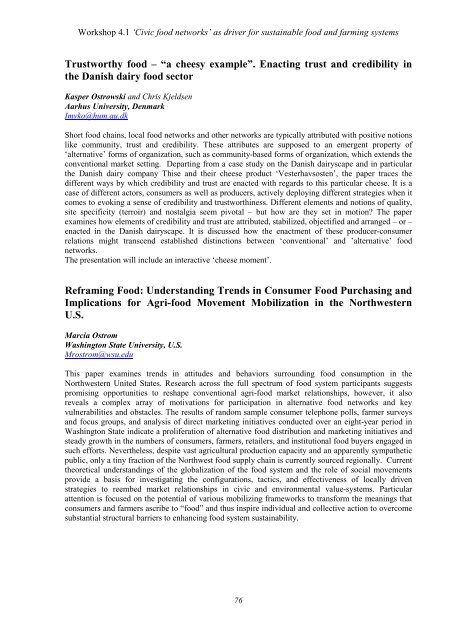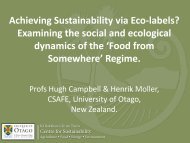Book of Abstract (incl. addendum) - IFSA symposium 2012
Book of Abstract (incl. addendum) - IFSA symposium 2012
Book of Abstract (incl. addendum) - IFSA symposium 2012
You also want an ePaper? Increase the reach of your titles
YUMPU automatically turns print PDFs into web optimized ePapers that Google loves.
Workshop 4.1 ‘Civic food networks’ as driver for sustainable food and farming systems<br />
Trustworthy food – “a cheesy example”. Enacting trust and credibility in<br />
the Danish dairy food sector<br />
Kasper Ostrowski and Chris Kjeldsen<br />
Aarhus University, Denmark<br />
Imvko@hum.au.dk<br />
Short food chains, local food networks and other networks are typically attributed with positive notions<br />
like community, trust and credibility. These attributes are supposed to an emergent property <strong>of</strong><br />
‘alternative’ forms <strong>of</strong> organization, such as community-based forms <strong>of</strong> organization, which extends the<br />
conventional market setting. Departing from a case study on the Danish dairyscape and in particular<br />
the Danish dairy company Thise and their cheese product ‘Vesterhavsosten’, the paper traces the<br />
different ways by which credibility and trust are enacted with regards to this particular cheese. It is a<br />
case <strong>of</strong> different actors, consumers as well as producers, actively deploying different strategies when it<br />
comes to evoking a sense <strong>of</strong> credibility and trustworthiness. Different elements and notions <strong>of</strong> quality,<br />
site specificity (terroir) and nostalgia seem pivotal – but how are they set in motion? The paper<br />
examines how elements <strong>of</strong> credibility and trust are attributed, stabilized, objectified and arranged – or –<br />
enacted in the Danish dairyscape. It is discussed how the enactment <strong>of</strong> these producer-consumer<br />
relations might transcend established distinctions between ‘conventional’ and ’alternative’ food<br />
networks.<br />
The presentation will <strong>incl</strong>ude an interactive ‘cheese moment’.<br />
Reframing Food: Understanding Trends in Consumer Food Purchasing and<br />
Implications for Agri-food Movement Mobilization in the Northwestern<br />
U.S.<br />
Marcia Ostrom<br />
Washington State University, U.S.<br />
Mrostrom@wsu.edu<br />
This paper examines trends in attitudes and behaviors surrounding food consumption in the<br />
Northwestern United States. Research across the full spectrum <strong>of</strong> food system participants suggests<br />
promising opportunities to reshape conventional agri-food market relationships, however, it also<br />
reveals a complex array <strong>of</strong> motivations for participation in alternative food networks and key<br />
vulnerabilities and obstacles. The results <strong>of</strong> random sample consumer telephone polls, farmer surveys<br />
and focus groups, and analysis <strong>of</strong> direct marketing initiatives conducted over an eight-year period in<br />
Washington State indicate a proliferation <strong>of</strong> alternative food distribution and marketing initiatives and<br />
steady growth in the numbers <strong>of</strong> consumers, farmers, retailers, and institutional food buyers engaged in<br />
such efforts. Nevertheless, despite vast agricultural production capacity and an apparently sympathetic<br />
public, only a tiny fraction <strong>of</strong> the Northwest food supply chain is currently sourced regionally. Current<br />
theoretical understandings <strong>of</strong> the globalization <strong>of</strong> the food system and the role <strong>of</strong> social movements<br />
provide a basis for investigating the configurations, tactics, and effectiveness <strong>of</strong> locally driven<br />
strategies to reembed market relationships in civic and environmental value-systems. Particular<br />
attention is focused on the potential <strong>of</strong> various mobilizing frameworks to transform the meanings that<br />
consumers and farmers ascribe to “food” and thus inspire individual and collective action to overcome<br />
substantial structural barriers to enhancing food system sustainability.<br />
76











